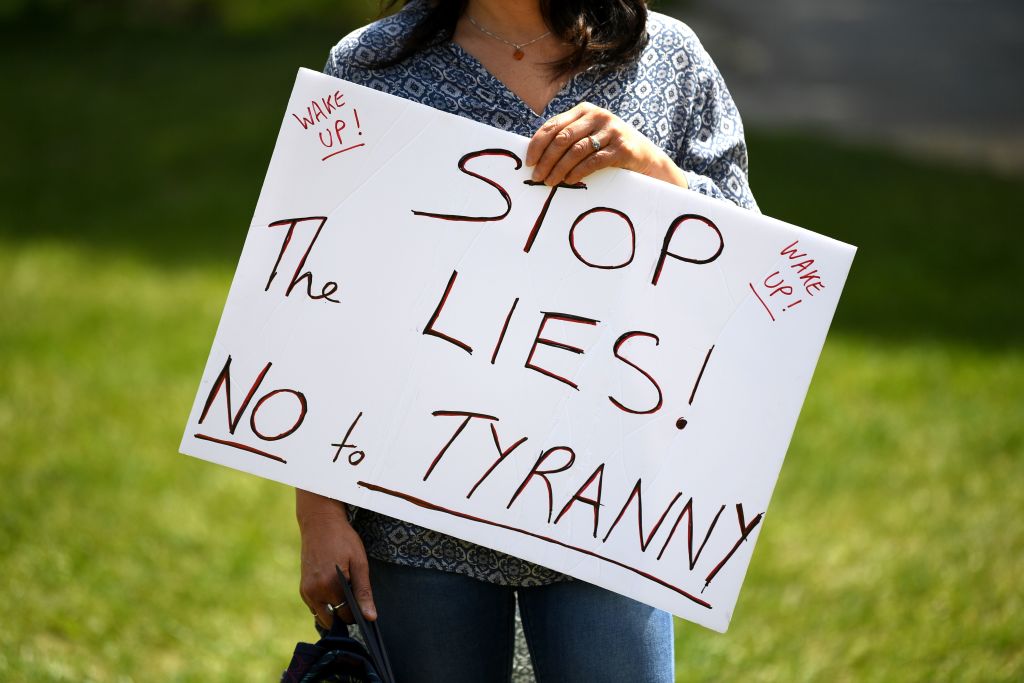Jeremy Corbyn’s brother, Piers, was among 19 people arrested at an anti-lockdown protest in Hyde Park at the weekend. The protest was small, as were those held in other cities across Britain, including ones in Belfast and Glasgow. Signs and chants held by demonstrators linked 5G and coronavirus. And familiar anti-Bill Gates slogans were chanted. It’s easy to dismiss the protesters as a bunch of eccentrics. But doing so might be a mistake.
It’s plausible to argue that the government should be pleased that the first public protests against the lockdown, coming almost two months after it was brought in, were both small and attended by people with fringe politics. Yet the protests should worry Boris Johnson and his cabinet, not just in relation to the coronavirus strategy but in regard to their whole project.
Piers Corbyn’s attendance was something of a red herring for several reasons. Labour politicians and the wider left are united in not only being pro-lockdown, but in many cases demonstrating borderline lockdown zealotry. It is instead within the ranks of elements of those on the right in which coronavirus scepticism is growing. Among this group includes those who had been lost to the Tories for a while, to Ukip first then the Brexit party. These people united behind the Conservative party in December. But if there is evidence of some in these groups turning against the government, Boris should be wary.
If this is correct, the tiny protests over the weekend could be the prelude to something much larger. I hope not, but it feels like anti-lockdown feeling is growing, which includes within its remit scepticism on almost all measures to combat coronavirus. As the economic downturn begins to be felt by more and more people, this could become something big, particularly if restrictions that disrupt normal life continue on for months to come. At present, the feeling is mostly confined to musings in the margins of Twitter. But as we’ve seen several times in the past decade, these are often the precursor to something that can quickly become mainstream.
In a worst-case scenario, I can see the government facing a squeeze at a point when the crisis looks to be almost at its end; when the rally round the flag effect will have played out completely.
From one direction, they could be blamed by Keir Starmer and his party for having been too lax early on; for not having instituted the lockdown early enough or with too few restrictions placed on movement. This would include a call for an official inquiry and suggestions that government inaction contributed directly to a higher death count. From the other direction, the charge could come that the lockdown was too harsh and went on too long or was perhaps even a complete mistake and with it the claim that the government has crashed the economy unnecessarily.
Although Nigel Farage has very wisely stayed out of the lockdown debate up to now, choosing instead to attack the government on illegal immigration – which is acting like a siren song to his erstwhile Brexit party supporters at present, albeit in small numbers for now – he could take a position on this when it is politically safe for him to do so. If anti-lockdown feeling hardens and grows further on the right, with the idea that the whole thing was a mistake start to finish, Farage could have a new platform from which to re-launch himself politically.
While this government is in the midst of still handling one of the greatest crises ever faced by any British government, they will have to look ahead to the post-coronavirus fallout, not just economically and practically, but politically as well.
The Tories won a large majority in December by uniting enough voters around the idea of ‘get Brexit done’. The hope was that Boris would have a full parliament to let his programme run and then be judged at the next election on the merits of its results. Coronavirus has severely damaged this agenda, with the fallout from the crisis looking set to cover most of the remainder of the current parliament. Boris is likely to be judged largely on the success or failure of his response to the coronavirus crisis. This, of course, places the PM in a potentially precarious position.
This may sound daft to some of you. ‘The Tories are at over 50 per cent in every poll, twenty points up on Labour, while Farage and his party are absolutely nowhere!’ Yes, all of that is true. But there are mitigating circumstances at play here, all of which could flip round and hurt the Tories sooner than anyone thinks. The wolves aren’t at the door but they are on the property. Watch for growth in anti-lockdown sentiment as an early distant warning signal.







Comments